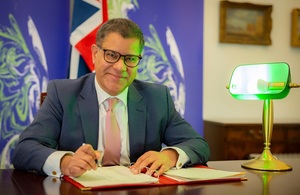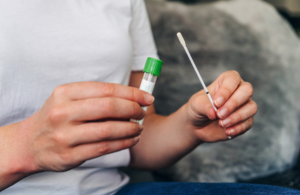The UK Prime Minister’s Special Envoy for Girls’ Education Helen Grant has just completed a regional tour of West Africa where she visited girls’ education, gender and inclusion projects in both Ghana and Sierra Leone.
Whilst visiting Ghana, Mrs Grant saw how UK aid is supporting children to learn both in-school and out-of-school. She took part in a live video lesson at Plan International’s Studio in Accra, connecting to girls and boys in over 30 secondary schools. She spoke to out-of-school girls being supported to learn by World Education Inc. and ICDP in the hills of Aburi, just outside of Accra.
She saw first-hand the impact catch-up classes have on the lives of young women who were unable to finish a formal education. She also met the Minister of Education, Dr Yaw Osei Adutwum, Ghana’s ‘CAMA’ network and civil society organisations to understand the positive impact of school bursaries, girls’ clubs, Free SHS and government’s re-entry policy for pregnant schoolgirls.
In Sierra Leone, Mrs Grant met with His Excellency, Julius Maada Bio of Sierra Leone and Honourable Minister for Education, David Moinina Sengeh to understand more about the Government’s recently launched ‘National Policy on Radical Inclusion in Schools’, which is aimed at making sure all children, including all girls and those with disabilities, are able to gain an education. She saw how UK aid is helping turn these aims into reality in schools in Hastings and Tombo, and in Freetown, launched the braille version of the policy with the Minister.
Concluding her West Africa visit, the UK’s Prime Minister’s Special Envoy for Girls’ Education Helen Grant said:
Investing in girls’ education is a game-changer and vital to building back stronger from the COVID-19 pandemic. The UK has set ambitious global targets to get 40 million more girls into school and 20 million more girls reading by the age of 10, which have now been adopted by the G7 under our presidency.
I am delighted that both Ghana and Sierra Leone share our ambition on getting girls learning, and it was a privilege to meet inspiring girls and boys who are supported to learn with the UK’s support. As we look ahead to the Global Education Summit, the UK’s partnership with Ghana and Sierra Leone is a vital example of how international collaboration can ensure all children, including girls, benefit from at least 12 years quality education.
The coronavirus pandemic has caused an unprecedented global learning crisis, with 1.6 billion children out of education around the world at the height of school closures. It has also compounded the obstacles to schooling that girls already face, including poverty, gender-based violence and child marriage. Supporting every girl to receive at least 12 years of quality education continues to be a key priority for the UK government, that’s why in Ghana and Sierra Leone, the UK government has:
- funded a communications campaign using local languages across Sierra Leone. The project aims to counter discrimination and gender-based violence, whilst supporting sexual reproductive health in local languages across the country
- during COVID-19 school closures, with UK aid, supported the Government to run Ghana Learning TV lessons nationwide, reaching more than 3 million children, and to continue Complementary Basic Education lessons in communities for out-of-school children
- set out an ambitious target to see 40 million more girls in school, and 20 million more girls reading by the age of 10, or at the end of primary school, in low- and middle-income countries by 2026
Speaking after the Special Envoy’s visit British High Commissioner to Ghana, Iain Walker said:
This week I have seen the enduring UK-Ghana partnership in action. Alongside the Special Envoy Helen Grant, I met some of those young women and girls whose lives have been changed through education, and, I have seen the work of those leaders, teachers and officials who are delivering the lessons, projects and support that is making the difference.
If we want to change the world for the better, girls’ education is the place to start. But it is only through firm resolve and collaboration that we will achieve our global ambition of ensuring all children across Ghana and around the world receive at least 12 years quality education.
British High Commissioner to Sierra Leone, Simon Mustard, added:
The UK is committed to ensuring that all girls access 12 years of quality education. The Government of Sierra Leone shares this commitment and has taken important policy steps in the past year in that direction. I am proud of the support that the UK is providing in Sierra Leone to play our part in turning these commitments into a reality.
Mrs Grant took up the role of UK Prime Minister’s Special Envoy for Girls’ Education in January 2021. Mrs Grant is also the UK Prime Minister’s Trade Envoy to Nigeria. In her role as Special Envoy for Girls’ Education, Mrs Grant is working to accelerate progress towards getting more girls into school and benefitting from quality learning.

